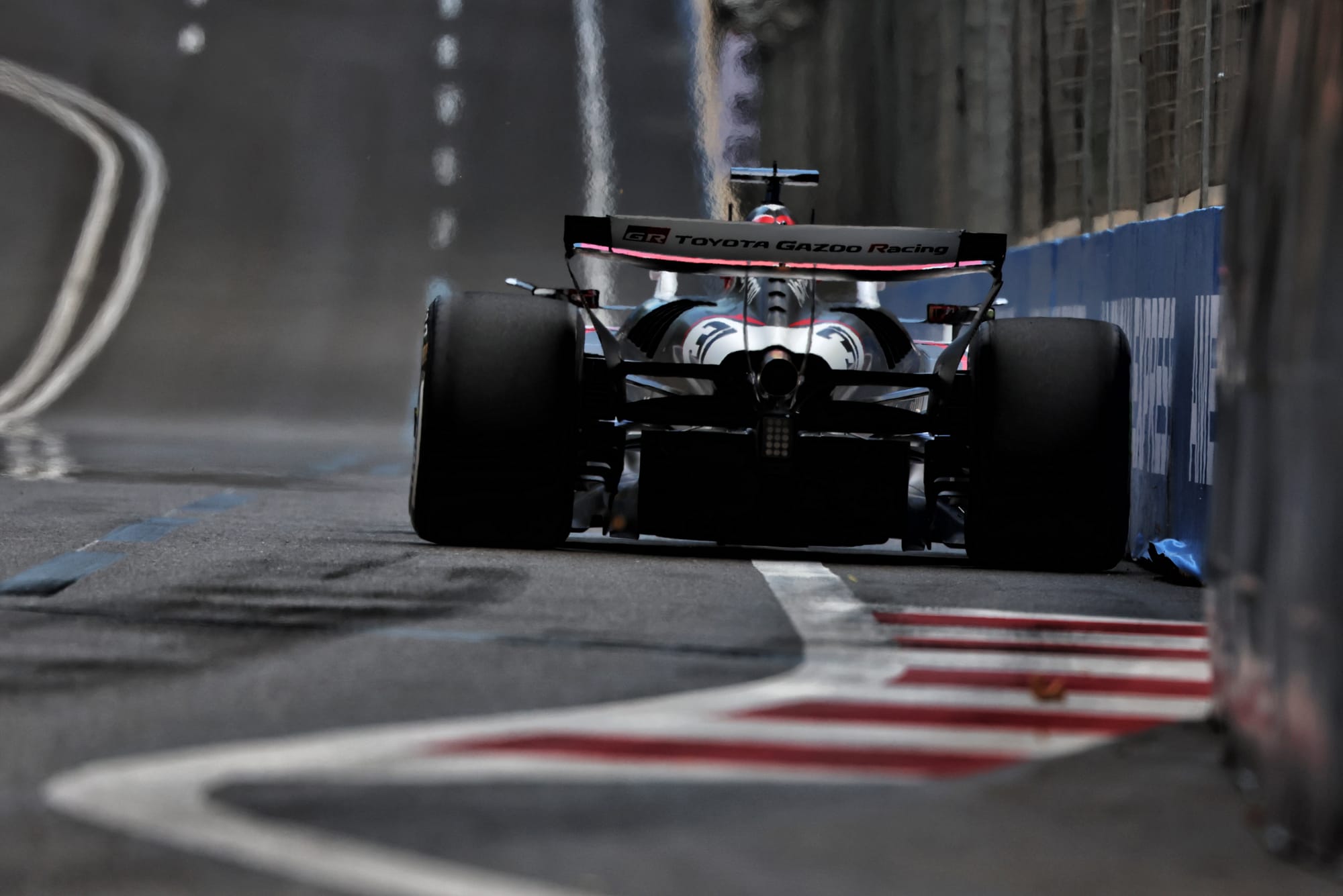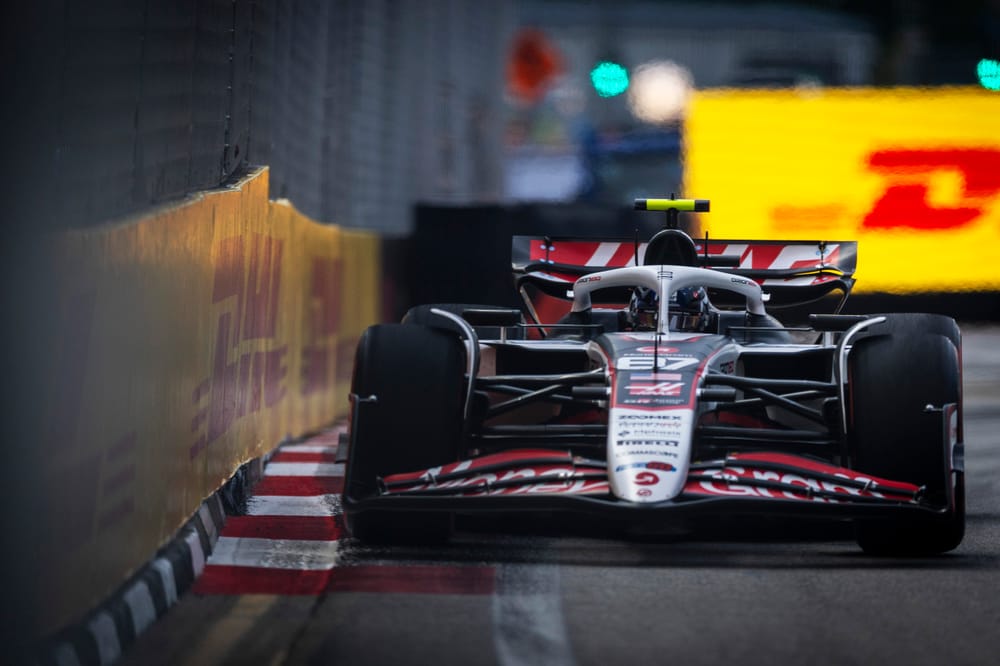While Haas hopes that an Austin upgrade will kickstart a late season push up the Formula 1 standings, its experience in 2025 has taught it that potential counts for nothing if you don't do anything with it.
The squad finds itself ninth place in the constructors' championship, and team boss Ayao Komatsu doesn't view this campaign as one where it has suffered because the car is not good enough, the drivers are not up to the job, or the decisions on the pitwall are subpar.
Instead, it is one where good results have repeatedly slipped through Haas's grasp because of the big impact of small errors.
Komatsu told The Race: "It's just about executing the whole weekend without any mistakes. We just don't seem to be able to do it, which is just extremely frustrating.
"I cannot remember, and I've been doing this for 22 years, having this level of car and then not converting it this much."
Costly errors
The disconnect between what on paper is a strong package and the reality of Haas missing out on points has no better shining example than the Belgian Grand Prix, where Haas both succeeded and failed.
Its car was quick around Spa-Francorchamps, with Esteban Ocon and Ollie Bearman taking fifth and seventh in sprint qualifying and then the sprint itself.
But for the main grand prix, neither driver got as far as Q3. Ocon missed out by two hundredths of a second while Bearman, having locked up at La Source in the wake of frustrations at getting passed by Yuki Tsunoda at the Bus Stop chicane ahead his final Q2 run, got dumped out, too.
In the race, Bearman's hopes were hit by both an engine problem and a high downforce set-up that proved not ideal for the conditions.
Meanwhile, Ocon's afternoon was effectively killed off when the team waited one lap too long to bring him in for slick tyres and he ended up falling behind a big train of cars.
As a catalogue of small errors snowballed into a double non-points finish, Komatsu admitted: "If anything happens like that, with such a competitive midfield, your qualifying is done and your race is done. The points are gone."
At Zandvoort, Bearman's charge from the back of the grid to finish sixth showed the potential in the car. But it could have been so much better if Haas had started nearer the front, as neither he nor Ocon had got out of Q1 after failing to unlock enough speed in qualifying.
At Monza, Bearman had been brilliant in qualifying to grab 11th on the grid at a track where the squad was not on the front foot. But all his efforts to potentially deliver points were derailed by his late-race clash with Carlos Sainz at the second chicane.
Azerbaijan was a similar story. On a weekend where Ocon suffered with brake problems, Bearman seemed to have found his groove in practice and looked to be in a good spot after cruising through Q1.
But a slight misjudgement on his first effort in Q2, which was not helped by a sudden gust of tailwind, put him in the wall and down in 15th on the grid - where a recovery was always going to be difficult from.
Each of these examples are small errors, but the consequences have been big in costing points.
As Bearman himself reflected afterwards: "It's a shame and it's a reminder that, no matter how fast everything is, if you don't put everything together, it doesn't matter. It's a harsh reality."
A mindset shift
Haas's failure to deliver all the points its car has been capable of is not just down to drivers.
Komatsu could see a certain irony in that the more competitive the team has been with its car over the course of the campaign, the harder the results have been to get sometimes.
Off the back of its huge struggles in Australia, and it bracing itself for some tough times, Haas enjoyed a strong run from round two in China where it punched above its weight and regularly finished in the points.
Contrast that with the British GP, for example, where track characteristics and an upgrade pointed to Haas having a great opportunity to bolster its points tally - only to see things go south.
Having put itself on the back foot with poor qualifying results and Bearman's grid penalty for his red flag pitlane entry infringement, it perhaps tried too hard on race day to be clever with its strategy where the coolness of Nico Hulkenberg showed a podium was on offer.
As Komatsu conceded: "We were forcing it, trying to look for the opportunity to recover when we should have just raced.
"My mindset was totally wrong. Ollie's mindset was wrong. I think the whole team's mindset was wrong.
"It's ironic that at the start of the season, when our car wasn't competitive, actually, we squeezed everything out of it. We got every single point that was on the table.
"Then finally, at Silverstone, having a competitive car, we start leaking points, left, right, and centre."
Constructors' championship midfield battle
5 Williams 102
6 Racing Bulls 72
7 Aston Martin 68
8 Sauber 55
9 Haas 46
10 Alpine 20
As painful as the missed opportunities have been, Haas needs to take heart that if singular mistakes are derailing weekends so much, then, when these small errors stop, the turnaround will be dramatic.
It is a similar situation to what Sainz and Williams found this year when what seemed to have been a never-ending run of circumstances killing their weekends suddenly stopped and a podium came calling in Baku.
Bearman showed Haas in Singapore, as he brought home a ninth-place finish, that when the weekends run as planned points are easily up for grabs. It now just needs to do it more regularly.
The question for the team though is how to dial out the errors beyond just keeping fingers crossed that they are not repeated.
Komatsu said: "I cannot just live and hope for that. Of course, it can happen, absolutely yeah, but I cannot just keep living in hope. So we got to think about everything. How can we make that happen?"
Addressing the problem

Part of the response will come from Komatsu simply giving leading senior figures, such as the revamped engineering and strategy team, time to bed down. Getting them gelling cannot be rushed.
"It's getting there, but we knew it was going to take time," he said. "The strategy side is definitely better now. In the race, communication is much better. There is so much more clarity, less noise, much calmer. So that one's definitely a huge step forward.
"On the race engineering side, considering it's the first year, it's improving all the time, which is, I guess, all I can ask for. Of course, I always wish to get there faster, but you have got to give people time."
Komatsu knows he also needs to deliver different things for his two drivers.
With Ocon, the onus is very much on the team trying to get him into a place where he is fully comfortable with the car.
Komatsu said: "I'm not saying he's slow, but when he's not 100% comfortable with the car, he cannot go there. Whereas Ollie, Ollie will drive around anything.
"In Baku, for example, Esteban wasn't happy with the braking performance of the car in FP3. I could see that on the data as well, because he was braking in certain corners so early, just taking margin.
"He had the same thing in qualifying and the feeling got worse. He was taking huge margin in some of the braking zones, and it was game over.
"Esteban's much more sensitive, but his speed is there. We have got to give him a certain car to fill him with confidence."
For Bearman, the issue is getting him to tame the natural talent that makes him so fast in the first place to dial back on the costly incidents.
"If you look at Brazil last year, he had five hours' notice, jumped in the car, no information on FP1, and then beat Nico [Hulkenberg] by three tenths [in both FP1 and sprint qualifying]. That's amazing, right?" said Komatsu.
"But the very thing that enabled him to do that is the thing that is causing him to crash. You don't have to be that quick, if you like.
"He is unbelievably quick. But he has got to step it back a tiny bit - and it is in judging that tiny bit that he is still not getting there.
"He is just finding it difficult to judge: is this 99% or is this actually 99.8%? So that's where the challenge is."
This is not to say that there is no progress. Komatsu said he is seeing fewer mistakes from Bearman, a more structured approach to practice, and more consistency across the weekend. Now it is about being error-free.
From Komatsu's perspective, delivering is not just about dialling out the mistakes to help Haas's points tally. He felt they could prove defining for Bearman's own future.
"I spoke to him before the summer shutdown," said Komatsu. "I told him this last part of the season, you have just got to deliver consistently. Otherwise, people are going to remember you as somebody who just had amazing speed but crashed quite often."
But for all the talking and agreement in private about how to approach things, and the positive signs, the final call is down to the one doing the driving.
"That last bit I cannot help that, and the team cannot help that anymore," said Komatsu. "We've done all the preparation, we've talked about everything. At that moment only you can judge how much margin you need to leave."
And it is these moments that are defining Haas's season.



